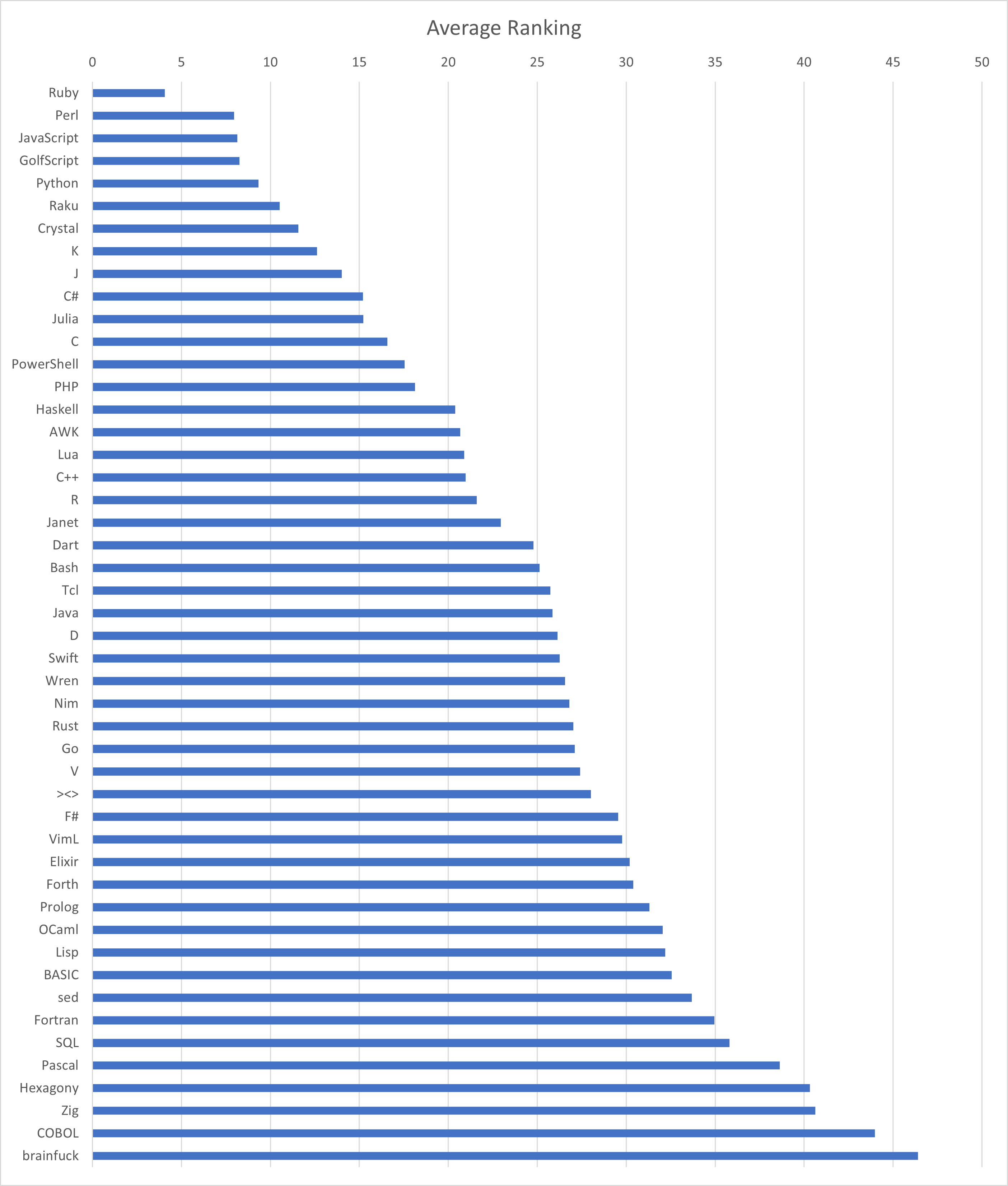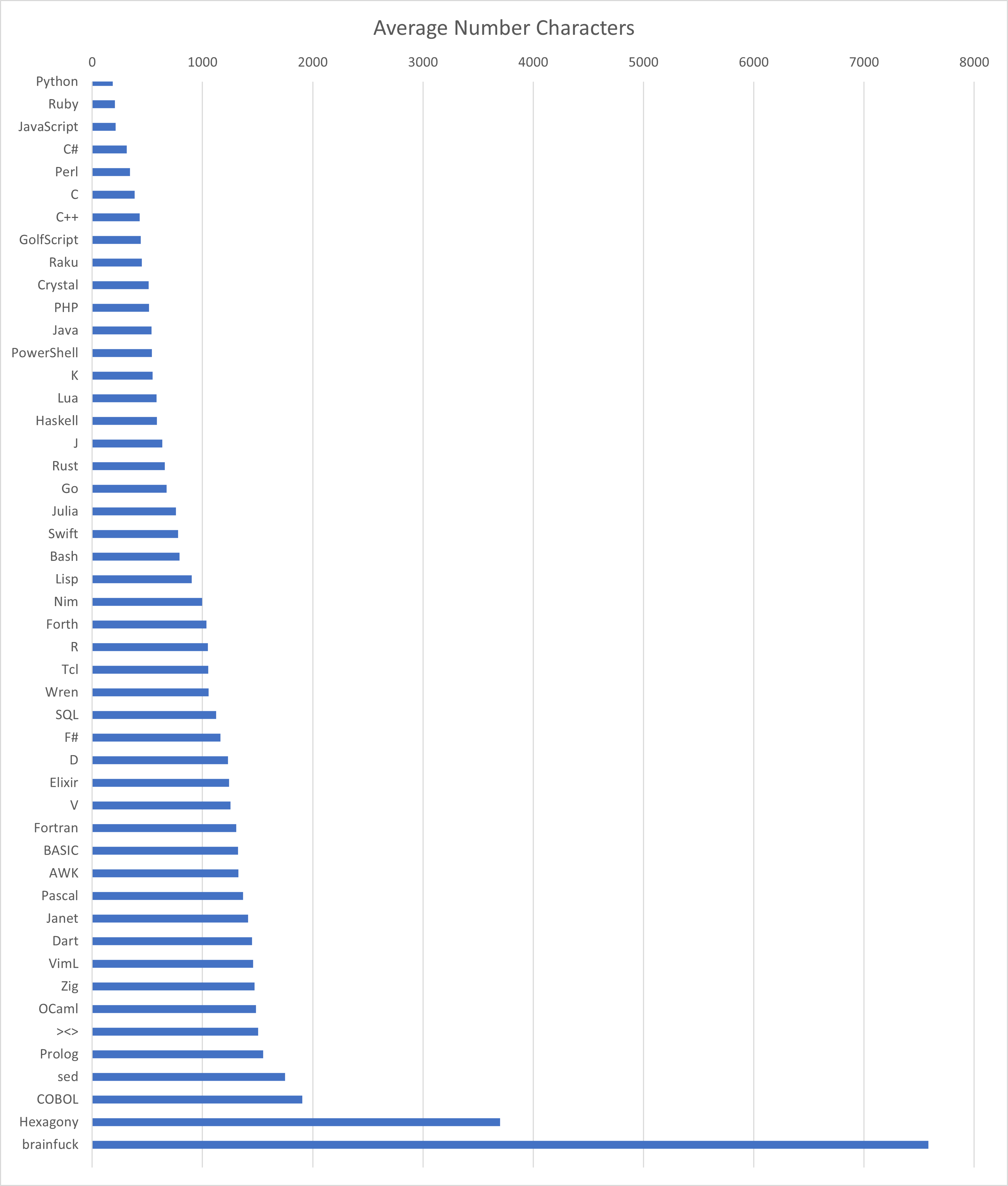Java placed way better than I expected
Programming
Welcome to the main community in programming.dev! Feel free to post anything relating to programming here!
Cross posting is strongly encouraged in the instance. If you feel your post or another person's post makes sense in another community cross post into it.
Hope you enjoy the instance!
Rules
Rules
- Follow the programming.dev instance rules
- Keep content related to programming in some way
- If you're posting long videos try to add in some form of tldr for those who don't want to watch videos
Wormhole
Follow the wormhole through a path of communities !webdev@programming.dev
You can write concise Java. Just like you can write readable Haskell. It’s just not idiomatic to do so.
It is always dismissed as too verbose, while in go’s case it is never mentioned, when in fact the latter is way more verbose.. People’s bias show.
Maybe also bias by the number / experience of people using it.
1st semester students getting shocked by public static void main(String args) and meming it on the internet.
Go on the other hand likely isn't a common choice / option for a first language.
I will gladly complain any day about go being terribly verbose.
Code Golf rules allow people to submit an anonymous function instead of a full program, which eliminates a lot of the boilerplate.
They weren't writing enterprise Java or they'd need a dozen factories and a few factory factories and probably a factory factory factory just to be safe.
I don’t know the specifics of the golf problems, but I’m mostly in c#, also notorious for “having too much boilerplate,” and it looks like it’s 3rd by char count.
My guess is that languages with comprehensive standard libraries can do more with less custom code. As you should expect.
I wonder if it's all those variables named with single letter and abbreviations, so annoying to code review
I'd love to see the same comparison with more real-world use-cases.
Code golf, is mostly pretty simple use-cases, which have been optimized many times over.
When, you build out an application with a user-interface, proper event handling, etc.... c++ is MUCH more verbose then c# for example, and they are ranked pretty close together.
Not expected C# to be this high. Also did not expected F# be so far away from C#.
Yeah that seems suspicious. F# is pretty succinct.
My guess is that this is really a measure of how much abuse the language will tolerate. C# probably lets you get away with a bunch of things (like checking for nulls) that F# requires.
In newer versions of C# you can use top level statements, which remove a lot of characters
On another look, though, we have to keep in mind, though that this is code-golf, so in no way representative for actual code-bases.
Haskell being so high really doesn't make any sense. Experience level maybe?
It's one of the tersest languages out there.
Bash being so high is what confuses me.
Damn near everything is an acronym
I guess it takes more calls to different programs to do a task
It's hard make such comparisons on "real world" code, and challenges use to be more attractive to people trying to learn, so your hypothesis make sense.
I'm really surprised to see Java ranked as less-verbose than OCaml.
Here's an equivalent code sample in Java 17 vs OCaml:
Java:
abstract sealed class Expr permits Value, Add, Subtract, Multiply, Divide {
abstract long eval();
}
record Value(long value) extends Expr {
@Override
long eval() { return value; }
}
record Add(Expr left, Expr right) {
@Override
long eval() { return left.eval() + right.eval(); }
}
record Subtract(Expr left, Expr right) {
@Override
long eval() { return left.eval() - right.eval(); }
}
record Multiply(Expr left, Expr right) {
@Override
long eval() { return left.eval() * right.eval(); }
}
record Divide(Expr left, Expr right) {
@Override
long eval() { return left.eval() / right.eval(); }
}
OCaml:
type expr =
| Value of int
| Add of expr * expr
| Subtract of expr * expr
| Multiply of expr * expr
| Divide of expr * expr
let rec eval = function
| Value value -> value
| Add (left, right) -> (eval left) + (eval right)
| Subtract (left, right) -> (eval left) - (eval right)
| Multiply (left, right) -> (eval left) * (eval right)
| Divide (left, right) -> (eval left) / (eval right)
....Java has so much more syntactical overhead than OCaml, and that's even with recent Java and being pretty aggressive about using boiler-plate reducing sugars like Records. And F# has even less, since it doesn't require you to use different operators for numerics or do as much manual casting between strings/numerics
Just gonna drop by to say that I love Crystal
How is it's current state for building windows binaries? As a game dev who wants to fiddle with doing "everything from scratch" at least once, Crystal always seemed extremely enticing, the syntax more so than Nim
I'm surprised C is so low. I feel like I need to write 5x more code (compared to C++/Rust) to do the exact same thing.
Hmm interesting, I would've thought that Haskell would rank much higher
What the heck is brainfuck?? Maybe a hot take but I wouldn't wanna program in that /s
https://en.m.wikipedia.org/wiki/Brainfuck
For those wondering (like myself)
------[-->+++<]>.--------.-.----------.+.+++++++++++++.[-->+++++<]>+++.+[->+++<]>+.+..[--->+<]>+++.++[---->+<]>+.+[----->+<]>+.+++++++.-.++++++.
Everyone's comparing the placements of their favorite language and I'm just left wondering how GolfScript gets beaten by seven other languages. I take it out was created specifically to do well on code golf? Mission failed, I guess.
This is why I love Ruby: Nearly as concise as Python but never complains about whitespace or indentation.
I've never understood the complaint about forced indentation. What kind of monster doesn't use indentation for their code anyway?
If anything, it's nice that the language forces it on you so that you don't stumble on code written by one of those monsters.
For me at least, it's less about forcing indentation as much as limiting what I can do with visual indentation.
Sometimes, it's nice to group lines at a given indentation level for visual comprehension vs the needs of the interpreter.
And to be fair, I don't hate Python's indentation style. It's usually not a major problem in practice. It's just that without the ability to override it, I lose a tool for expressing intent.
Would assembly be higher or lower than brainfuck?
Assembly would be lower. You have more complex / direct instructions in assembly. Brain fuck is pretty much just a pure turing machine, and has 8 instructions.
X86 has ~ 1000 + variants. Even ARM with a smaller instruction set has 232 instructions.
In brain fuck to set a number you'd have to count up (or down - underflow) to that number. In assembly you just set it.
Somewhere I've read that current assembly code with Makros should be similar to writing C.
Why would golfscript be more verbose than some others? Isn't it made for golfing?
Rest in pieces golfcels it's pychad time
Is Dart inherently verbose, or does it just seem that way because people are using it to make Flutter widgets and they're verbose? When you look at the Dart syntax it doesn't seem like it needs to be verbose, but Flutter code certainly can be.
This is from codegolf competitions, so non-Flutter I'd assume.
I'm suprised by F# position
Interesting that zig is so much lower than c in expressiveness. Isn't that a bit weird?
With my professional experience in COBOL, I can honestly say I'm not surprised at all!
How come kotlin isn't there
Apparently it due to an issue with Kotlin - https://github.com/code-golf/code-golf/issues/151#issuecomment-1126266250
It's interesting, the results here are way different than the Code Golf & Coding Challenges Stack Exchange. I would never expect Haskell to be that low. But after looking at code.golf, I realize it's because I/O on CG&CC is more relaxed. Most Haskell submissions are functions which return the solution.
Sidenote: I like the CG&CC method, it's semi-competitive, semi-cooperative.
- all languages welcome
- almost all users post "Try it Online"/"Attempt This Online" links
- most users post explanations under their submissions
- often people will post solutions beginning with "port of user1234's excellent Foolang answer" when there's a clever shortcut someone finds
- or people will post their own solution with "here's a solution which doesn't use user1234's algorithm"
- or people will add comments to answers with minor improvements
IMO It's geared towards what is the best part about code golf: teaching people about algorithm design and language design.


